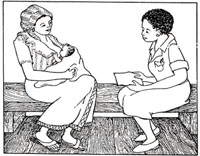12.4.2 Counselling mothers who are HIV-positive
One of the routes of HIV transmission from mother to child is through breastfeeding. Therefore it’s very important to counsel a mother who is HIV-positive on feeding options to her infant (see Figure 12.5). In this section we will discuss how you can help mothers decide the preferred feeding options for her child.

If an HIV-positive mother comes to you for counselling on how to feed her infant, how will you counsel her? Exclusive breastfeeding? Exclusive replacement feeding? Or mixed feeding? You may have to help her choose between two ‘evils’. It’s a difficult choice. First, as you have learnt, breastmilk is very important for the survival of the child. The difficult thing in recommending continuing breastfeeding is that HIV infection is present in breastmilk. So when you advise the mother to continue with exclusive breastfeeding, she needs to know she is possibly exposing the child to HIV infection.
If, on the other hand, you advise the mother on exclusive replacement feeding, the positive thing is that there will be no exposure of the child to the HIV virus. So the child will probably remain HIV-free. The difficult thing with this option is that not giving a child breastmilk, but relying on infant formula, is associated with a high rate of morbidity and mortality. The high risk of malnutrition and diarrhoeal diseases are very common in children who are not breastfed, especially in resource-limited countries.
12.4.1 Breastfeeding and HIV
